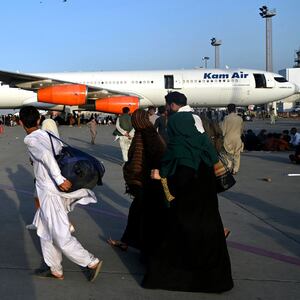Amid the chaos of the U.S. withdrawal from war-torn Afghanistan last month, I wrote frantically about my efforts to assist with the evacuation of a 20-year-old female Afghan journalist on the Taliban’s ‘kill list,’ whom The Daily Beast referred to as Meena. Her 27-year-old sister, whom we called Nadia—also a journalist wanted by the Taliban—was able to escape to the Netherlands, where she has been living in a refugee camp for four weeks. She was guilt-ridden and devastated about having to leave her sister behind.
Nadia had asked that I do everything I can to help Meena get out. Earlier efforts to evacuate Meena through Kabul’s airport had failed after a deadly suicide bomb led to the closure of the airport. “My sister will be lost without help,” Nadia pleaded at the time. “She has never been alone.”
Fast-forward to Monday: After almost a month of tedious planning, failed attempts, and agonizing waiting games, Meena has finally made it out of Afghanistan.
Her rollercoaster escape story began after I was connected to Tarjoman.Org, a nonprofit run by Afghanistan war veterans and volunteers helping to get those hunted by the Taliban to safety. Four weeks ago, retired Sergeant Major Gonzalo Lassally, an American veteran of the Afghan war who serves as the NGO’s chief operating officer, called upon his Afghan partners to help Meena and her family leave their home during the early morning hours.
“Ultimately, in Pakistan, they will be given asylum.” Lassally told me at the time. “When we met you, we were already dealing with other veteran networks, an underground Afghanistan railroad.”
According to Lassally, Meena was prioritized due to her place on the ‘kill list’ and her age. “She could have been forced to marry a Taliban fighter because for them it’s their spoils of war,” he said.
While Lassally worked logistics, I gathered Meena and her family's documents, including national IDs and phone numbers to connect them with other members of the team. Meena was encouraged to stay calm and follow the team's instructions meticulously, as one small drift away from the plan could be fatal.
On Aug. 27, the team was able to get her to a gym that was serving as a secret safe house. She texted me that night saying she had arrived. But that sanctuary was short-lived; the Taliban discovered the gym on their first night there, and Meena escaped swiftly back to her home. “I think the safe houses are more vulnerable to the Taliban. We will stay with relatives for now,” she told me.
In the midst of that ordeal, Meena wrote to me, defeated: “These days it is very depressing and boring. I try very hard to be strong. I think I get more frustrated with each passing day… Please get me out of this hell sooner.”
It took another two weeks to finalize a new plan. It would involve taking Meena and two of her immediate family members, her mother and younger brother, directly across the border to Pakistan in a car.
But Meena was understandably worried about taking the Pakistan route. She had heard rumors that Pakistanis were beating Afghans at the border gate and was afraid of being stopped by Taliban fighters on the way over. “It's too dangerous to go to Pakistan,” she told me in early September. But the situation in Kabul was deteriorating rapidly under Taliban rule and after stepping outside of her house for the first time in weeks, Meena began to come to terms with the decision she had to make.
“I had to go to university and I saw with my own eyes that girls were not allowed inside the university, even though they wore hijab,” she said. “On the way home, a woman was beaten at a crossroads with a whip because her feet were exposed. It is really hard to bear.”
And with that, Meena and her family made the decision to leave the only home they’ve ever known. They were told to pack whatever they could cross the border with and to delete any exchanges with Americans on their devices. Lassally arranged for an Afghan partner to pick the family up from their home on Monday morning.
“We were able to get her into a car, then there was a transfer of vehicles. We constantly change cars for safety,” Lassally explained. “Then they communicated with a crossing guide, who walked them across the border.”
Throughout the journey, Meena said she was terrified that the plan would fall apart.
“Until the last moment I left Afghanistan, even when I was at the gate on the Pakistan-Afghanistan border, I felt scared,” she said. “There was a checkpoint where the Taliban stood with horrifying looks and weapons... they looked into the car at every checkpoint and even checked our bags. My mother was afraid that the Taliban would see my nails. They're a little long. At every checkpoint, she reminded me to hide my hands.”
In a group chat with Lassally, I was updated on each step of their mission. Finally, after what seemed like an eternity, we were notified they crossed safely across the border into Pakistan.
I began shaking in disbelief that she was out of Afghanistan. This was my promise.
“Like the movies you see, when a person comes out of a panic and intolerable place, he takes a deep breath,” Meena told me after arriving at her hotel. “Exactly when I left Afghanistan, I took a deep breath so that when I left, all the fear of the Taliban and death came out of my heart.”
For now, the family is staying in a hotel until they get an apartment. They don’t know where they’ll end up—just that they are now free. Meena is hoping to reunite with her sister soon and, after that, get to work on her first novel.
“After more than a month I feel safe and I’m glad to sleep tonight away from the horror and the sound of gunfire and bullets,” Meena told The Daily Beast. “I’m still shocked. Because I can’t believe I was finally released. But from now on, my dreams and goals have been revived.”








